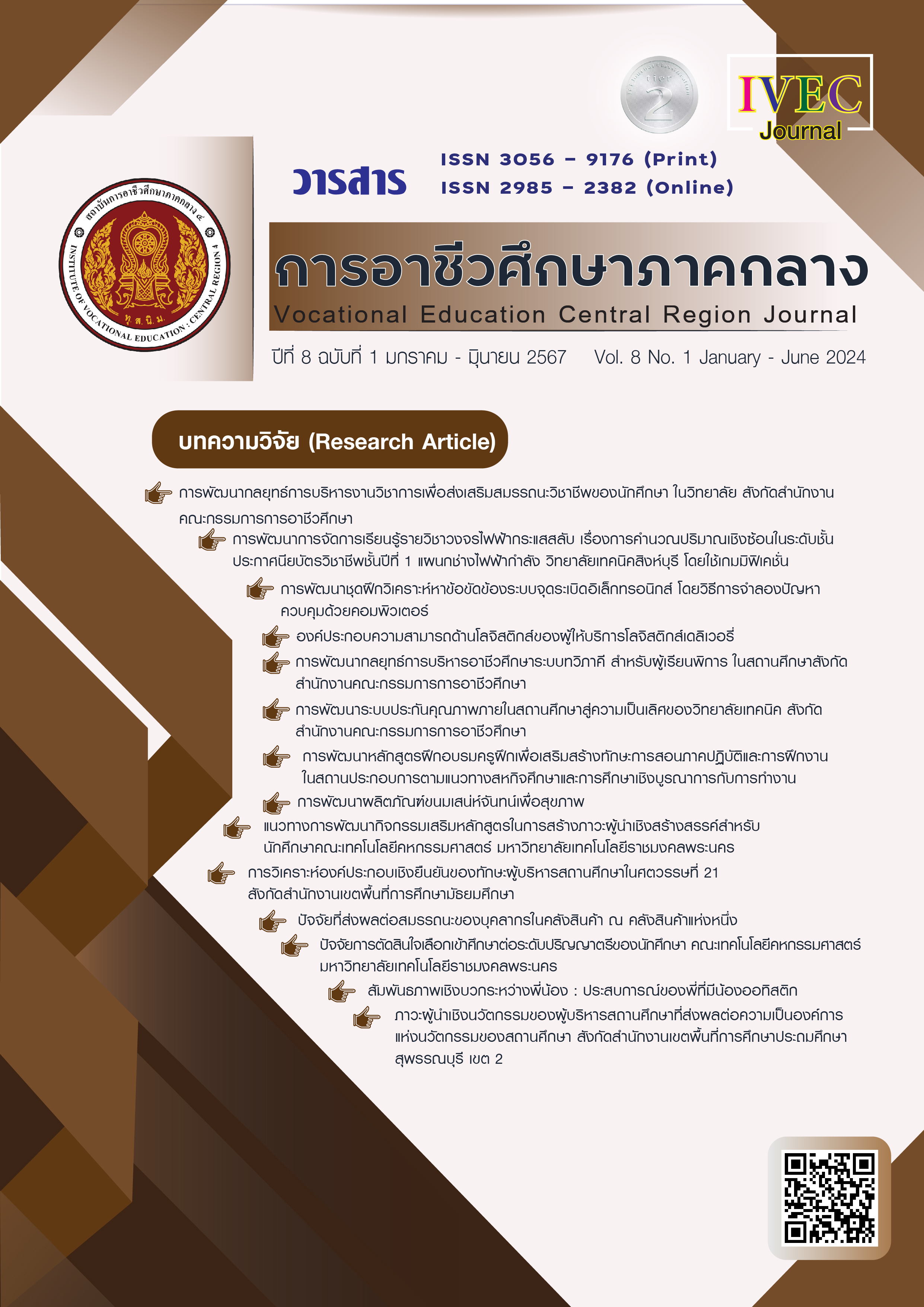Development of Training Curriculum for Trainers in Order to Up-Skill/Re-Skill of Coaching and Apprentice in Enterprise According to Cooperative and Work Integrated Education
Main Article Content
Abstract
The purposes of this research were 1) to study level of trainers ‘problems and ‘training needs assessment in Entrepreneurs in Eastern Economic Corridor (EEC), 2) to develop training curriculum enhancing trainers’ coaching and writing on-the job training plan, and 3) to evaluate that curriculum. The research process was divided into 3 phases. The first phase was survey research in order to study level of trainers ‘problems and training needs assessment. The second phase was curriculum development. The third phase was curriculum implementation and evaluation. In this research, the samples were divided into 3 groups i.e. (1) a survey group comprising of 353 administrators and trainers who were selected by simple random sampling and participated with students ‘practicum in vocational education and higher education in Entrepreneurs in Eastern Economic Corridor (EEC), (2) a pilot group comprising of 20 trainers, and (3) the group for curriculum evaluation comprising of 30 administrators and trainers who were selected by purposive sampling. The research instruments were problems and needs for training questionnaire, training curriculum was R&D consisted of 4 steps, namely, problem analysis and need assessment, curriculum development, curriculum verification, and curriculum improvement, coaching and on-the job training plan skill test, and questionnaire for opinion assessment. The data was analyzed by mean, standard deviation, efficiency criteria (E1/E2), and t-test. The research findings were summarized as follows:
1. The study of level of trainers ‘problems and ‘training needs assessment.
1.1 Overall, the level of trainers ‘problems were rated at the high level ( = 3.69, SD =0.38).
1.2 Overall, the level of trainers ‘training needs assessment were rated at the high level ( = 3.86, SD =0.36).
2. Training curriculum for trainers in order to up-skill/re-skill of coaching and apprentice in Enterprise according to Cooperative and Work Integrated Education was developed, and evaluated the training curriculum was suitable and rated at the high level by experts ( = 4.47, SD =0.50).
3.The results of curriculum implementation and evaluation revealed that,
3.1 The pilot study of curriculum implementation had the efficiency value (E1/E2) with the average of 77.50/75.50 that higher than the criterion, and the scores of trainers’ coaching and on-the job training plan skill after training was higher than that before training at the significant of 0.05 level.
3.2 The study of curriculum evaluation had the efficiency value (E1/E2) with the average of 80.50/80.83 that higher than the criterion, and the scores of trainers’ coaching and on-the job training plan skill after training was higher than that before training at the significant of 0.05 level.
3.3 The scores of trainers’ coaching skill were rated at the expertise level in the field of mechanic, mechanical technician, and electrician. The scores of trainers’ on-the job training plan skill were rated at the expertise level in the field of mechanic, mechanical technician, electrician, and welder.
3.4 The trainers’ opinions on training curriculum were rated at the high level ( = 4.41, SD =0.28).
Article Details

This work is licensed under a Creative Commons Attribution-NonCommercial-NoDerivatives 4.0 International License.
|
บทความ ข้อมูล เนื้อหา รูปภาพ ฯลฯ ที่ได้รับการตีพิมพ์ในวารสาร การอาชีวศึกษาภาคกลาง ถือเป็นลิขสิทธิ์ของวารสารการอาชีวศึกษาภาคกลางหากบุคคลหรือหน่วยงานใดต้องการนำทั้งหมดหรือส่วนใดส่วนหนึ่ง ไปเผยแพร่ต่อหรือเพื่อกระทำการใด ๆ กองบรรณาธิการไม่สงวนสิทธิ์ ในการคัดลอกบทความเพื่อการศึกษาแต่ให้อ้างอิงแหล่งที่มาให้ครบถ้วน สมบูรณ์ สงวนสิทธิ์ โดย สถาบันการอาชีวศึกษาภาคกลาง 4 ที่ตั้ง 90 ถนนเทศา ตำบลพระปฐมเจดีย์ อำเภอเมือง จังหวัดนครปฐม โทรศัพท์ 034 242 856 , โทรสาร 034 242 858 ISSN : 3056-9176 (print) ISSN : 2985-2382 (online) |
References
กรกนก วรหา, นิรุต ถึงนาค, และ ชมพูนุท เมฆเมืองทอง. (2565, มกราคม–มิถุนายน). การพัฒนาหลักสูตรฝึกอบรมแบบผสมผสาน เพื่อเตรียมพร้อมสู่อาชีพช่างเชื่อม สำหรับนักศึกษาครูช่างอุตสาหกรรม. มนุษย์ศาสตร์และสังคมศาสตร์ มหาวิทยาลัยราชภัฏอุดรธานี, 11, (1), หน้า 155-173.
จันทรานี สงวนนาม. (2551). ทฤษฎีและแนวปฏิบัติในการบริหารสถานศึกษา (พิมพ์ครั้งที่ 2). กรุงเทพฯ: บุ๊คพอยท์.
ชาญณรงค์ ศรีจันทร์. (2562). การพัฒนาหลักสูตรสำหรับครูเพื่อเสริมสร้างความสามารถในการประดิษฐ์ดอกไม้ใบตองเชิงเศรษฐกิจสร้างสรรค์ของนักเรียน. วิทยานิพนธ์ ปริญญาศึกษาศาสตรมหาบัณฑิต สาขาวิชาหลักสูตรและการนิเทศ บัณฑิตวิทยาลัย มหาวิทยาลัยศิลปากร.
บุญชม ศรีสะอาด. (2545). การวิจัยเบื้องต้น (พิมพ์ครั้งที่ 7). กรุงเทพฯ: สุวีริยาสาสน์.
พงศ์ศักดิ์ กีรติวินทกร, ชารินทร์ จูฉิม, ธีราทร ซนีเย็ง และ รณชัย เพชรรักษ์. (2560, เมษายน-มิถุนายน). การพัฒนาแรงงานฝีมือด้วยการพัฒนาครูฝึกในสถานประกอบการตามแนวทางมาตรฐานเยอรมัน. พัฒนาเทคนิคศึกษา, 29, (102), หน้า 3-11.
ยุทธ ไกยวรรณ์. (2559). การวิจัยและพัฒนาหลักสูตรฝึกอบรม. กรุงเทพฯ: จุฬาลงกรณ์มหาวิทยาลัย.
ศิริชัย โพธิวัฒน์ และ รวีวรรณ ชินะตระกูล. (2558, พฤษภาคม-สิงหาคม). การศึกษาความต้องการจำเป็นการสอนงานของหัวหน้างานในอุตสาหกรรมการผลิตชิ้นส่วนยานยนต์ในเขตพื้นที่จังหวัดสมุทรปราการ. ครุศาสตร์อุตสาหกรรม, 14, (2), หน้า 260-267.
สิราวรรณ จรัสรวีวัฒน์. (2554). การพัฒนาหลักสูตรฝึกอบรมเพื่อเสริมสร้างทักษะการสะท้อนคิดของนิสิตฝึกปฏิบัติการสอน คณะศึกษาศาสตร์มหาวิทยาลัยบูรพา. ดุษฎีนิพนธ์ ปริญญาการศึกษาดุษฏีบัณฑิต สาขาวิชาหลักสูตรและการสอน บัณฑิตวิทยาลัย มหาวิทยาลัยบูรพา.
สุทธิกร แก้วทอง. (2563). การพัฒนาหลักสูตรฝึกอบรมเพื่อสร้างเสริมสมรรถนะในการฝึกประสบการณ์วิชาชีพครูของนักศึกษาหลักสูตรครุศาสตรบัณฑิต สาขาวิชาพลศึกษา มหาวิทยาลัยราชภัฏ. ปริญญานิพนธ์การศึกษาดุษฎีบัณฑิต สาขาวิชาสุขศึกษาและพลศึกษา บัณฑิตวิทยาลัยมหาวิทยาลัย ศรีนครินทรวิโรฒ.
โอภาส สุขหวาน, ประพันธ์ศิริ สุเสารัจ, ธนรัตน์ แต้วัฒนา, และ วิไลลักษณ์ ลังกา. (2561, มกราคม–มิถุนายน). การพัฒนารูปแบบการสอนงานนักศึกษาอาชีวศึกษาระบบทวิภาคีประเภทวิชาอุตสาหกรรมสำหรับครูฝึกในสถานประกอบการ. วิชาการอุตสาหกรรมศึกษา, 13, (1), หน้า 1-13.
Taba, H. (1962). Curriculum development: Theory and practice. New York: Harcourt, Brace & Wor


